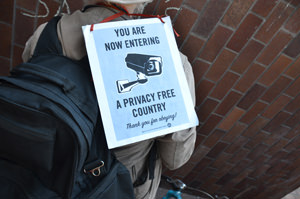World Fights Back Against the Biggest Brother in History
The United States' vast and indiscriminate worldwide surveillance of ordinary people and heads of state has no historical precedent. Now countries around the world are fighting back using the United Nations as a vehicle for change.Countries around the world are fighting back against surveillance using the United Nations as a vehicle for change.
The United States’ vast and indiscriminate worldwide surveillance of ordinary people and heads of state has no historical precedent. Now countries around the world are fighting back using the United Nations as a vehicle for change. In a move that received little media coverage in the U.S., a United Nations committee approved without a vote a draft resolution entitled “The Right to Privacy in a Digital Age.” The nonbinding resolution, which will now head to the General Assembly where it has broad support, follows from a report published in June by the United Nations Human Rights Council. It detailed the negative impact of state surveillance on free expression and human rights and lamented that technology has outpaced legislation.
The remarkable U.N. draft resolution affirms privacy as a human right, on par with other globally recognized civil and political rights. Several leading advocacy groups, including Access Now, Amnesty International, Electronic Frontier Foundation, Human Rights Watch and Privacy International, signed an open letter to the U.N. General Assembly backing the resolution. The letter stresses the “importance of protecting privacy and free expression in the face of technological advancements and encroaching State power.”
Carly Nyst, the head of international advocacy at Privacy International, told me, “This resolution could not be more important. At the moment we’re seeing serious threats to the protection of the right to privacy in the form of [National Security Agency] spying but also in the form of other surveillance practices that are taking place across the world. We think that voting in favor of this resolution is a really important stand for states to take so that they will no longer stand for global surveillance practices undertaken by the U.S. and others. This is a pivotal moment.”
Opposition to the U.N. resolution has come primarily from a small alliance of countries that share surveillance data, known as the “Five Eyes” (the United States, the United Kingdom, Canada, New Zealand and Australia). These five countries are party to a secret treaty originally signed by the U.S. and U.K. in 1941, which came to light only in 2010. Little is known about the details of the agreement. According to Nyst, “We know that there is a very, very high level of integration between the intelligence services of each of the [Five Eyes] countries to the extent that Americans are working out of Australian bases, the British are working out of New Zealand bases, etc. That information is shared, almost is standard across all five countries and there is no such thing as a no-spy deal. That means that even though they have a very high level of cooperation there are also instances in which they are spying on each other.” Nyst added, “It’s a completely secret, covert arrangement that implicates the privacy rights of almost everyone who uses the Internet.”
Despite the best efforts of the Five Eyes nations to weaken the U.N. draft resolution on privacy, opposition to U.S. spying is so strong that most of the original language remains unchanged. According to The Guardian newspaper, the only major compromise has been to drop a reference linking human rights violations to extraterritorial surveillance.
The U.S. also fought to limit the jurisdiction over privacy rights to countries themselves, but lost. That point underscores what many around the world see as a double standard between how the NSA spies on Americans versus non-Americans. The U.N. draft resolution enshrines the protection of privacy of all people equally.
According to Katitza Rodriguez, international rights director of the U.S.-based Electronic Frontier Foundation, “Most of the discussion around NSA spying in the United States has focused on the privacy rights of Americans because our laws only protect Americans but do not extend those protections outside U.S. borders. The U.N. resolution makes clear that privacy is an international universal human right and states have the obligation to protect privacy not only at home but also abroad.”
What has lent the resolution greater weight was that it was sponsored by two major nations: Germany and Brazil, whose leaders, Chancellor Angela Merkel and President Dilma Rousseff, were alleged to have been spied upon by the NSA. Nyst admitted that “Unfortunately, even though we knew months ago that the German people and the Brazilian people had been spied upon, it was not until the leaders of those countries found that they were also under the microscope, that they really were quite enraged and decided to take action at the international level. That is the unfortunate reality that until these practices were shown to affect the leaders of the highest level of power, it wasn’t necessarily politically useful for them to make a stand against the U.S.”
Nyst takes issue with nations, such as Brazil, that want to pursue electronic independence by developing their own Internet infrastructure to counter U.S. surveillance. She says, “In fact it would not necessarily be of benefit to Internet users if countries decided to splinter off to create their own networks to protect from U.S. spying. Actually one of the most important parts of the Internet which really guarantees our freedom to look at what we like online and to say what we like online is the decentralized nature of the Internet where no one country has control over it.”
Nyst fears that “If the result from this NSA scandal is that countries like Brazil and Germany — perhaps with good reason — decide that they want to splinter off and start protecting their citizens by establishing their own Internet, actually what we might see is a real balkanization of the Internet. And that means that citizens of some countries will have much worse protections than they previously have had. If a country like Russia or Iran or China followed their lead and said, ‘Well we too are going to establish our national Internet,’ then that would drastically disadvantage the citizens of that country. That’s the last thing that we as Internet advocates want to see.” Treating privacy as a fundamental, internationally recognized human right may offer the best protection to ordinary people from all countries. But even Americans, who are ostensibly better protected legally, have found that their privacy is often routinely violated and that they cannot do anything about it.
The U.N. resolution, if it passes, would lack enforcement mechanisms. The question then arises, what is the point? According to Rodriguez, it “definitely makes clear what is the standard to protect privacy globally and if the U.S. doesn’t comply with it then they will be in violation of international law. And that’s a huge problem because the United States has been seen as a champion of promoting free expression in the United Nations. So having them taking a position that infringes upon international law is not good for the reputation of the United States’ foreign policy.”
It is likely that the U.N. General Assembly will debate and vote on a version of the draft resolution in the coming months. Regardless of how robust the protections of privacy are in the final version, or how strongly the U.S. and its allies will feel bound by it, public opinion is certainly shifting in favor of treating privacy as a human right.
The Electronic Frontier Foundation and Privacy International are leading a collaboration with hundreds of civil society organizations worldwide on a framework reflecting global consensus on privacy rights called Necessary & Proportionate. That effort reflects a growing global grass-roots movement forming in parallel to the U.N.’s attempt to protect privacy. It remains to be seen whether the world can win the fight against the Biggest Brother history has ever witnessed.
Your support matters…Independent journalism is under threat and overshadowed by heavily funded mainstream media.
You can help level the playing field. Become a member.
Your tax-deductible contribution keeps us digging beneath the headlines to give you thought-provoking, investigative reporting and analysis that unearths what's really happening- without compromise.
Give today to support our courageous, independent journalists.






You need to be a supporter to comment.
There are currently no responses to this article.
Be the first to respond.